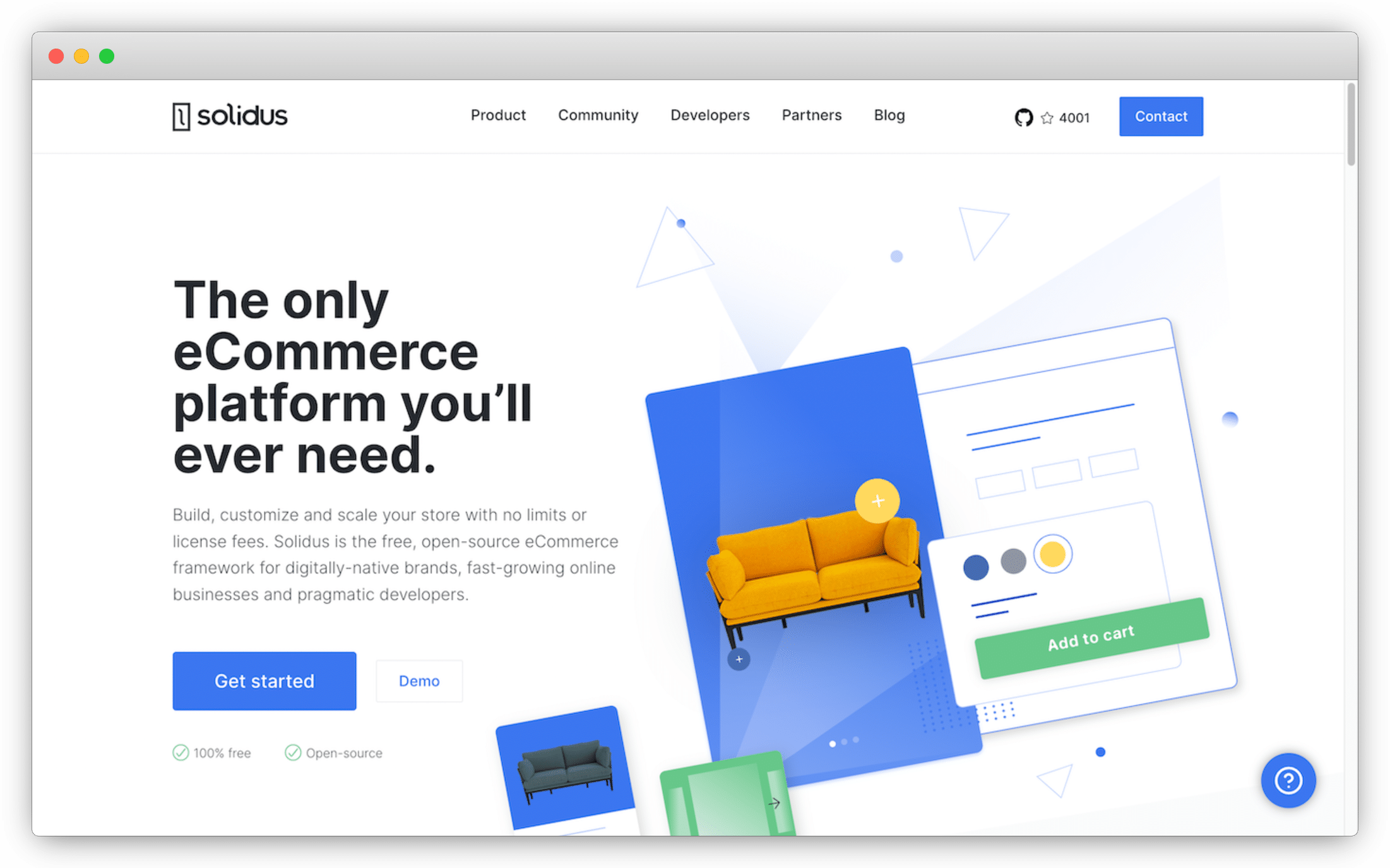The Top Open Source E-Commerce Platforms

Open source e-commerce platforms provide a flexible and powerful framework for launching an e-commerce store, but contribute to the TCO of running and operating an online store.
SaaS e-commerce solutions shift the responsibility for development, maintenance, and security from the brand to the service provider, though they can have limited functionality compared to open source e-commerce solutions.
The best open source e-commerce platforms provide expansive feature sets with unlimited potential for growth and scalability, though specific features and functionality varies from platform to platform.
Headless e-commerce platforms like fabric fuse the customization and versatility of open source e-commerce solutions with the benefits and ongoing support of SaaS alternatives, helping brands scale and grow without incurring significant technical debt.
Online e-commerce platforms are one of the most evolving sectors of the web. Driven by B2C sales, B2B adoption, and adaptation to the COVID-19 pandemic, the global e-commerce market size is expected to grow at a CAGR of 14.7% between 2020 and 2027.
Pivoting to e-commerce gives retailers advantages over the traditional model, improving product discovery, personalization, and reach. But to benefit from these advantages, retailers need to decide on an e-commerce platform that supports their approach, capabilities, and needs, helping teams coordinate merchandising, marketing, sales, and fulfillment efforts across channels.
When deciding on an e-commerce strategy, retailers must decide between open source e-commerce platforms and SaaS options, each of which supports a different approach to launching — or replatforming — an e-commerce store.
[toc-embed headline=”Features of Open Source Vs SaaS E-Commerce Platforms”]
Features of Open Source Vs SaaS E-Commerce Platforms
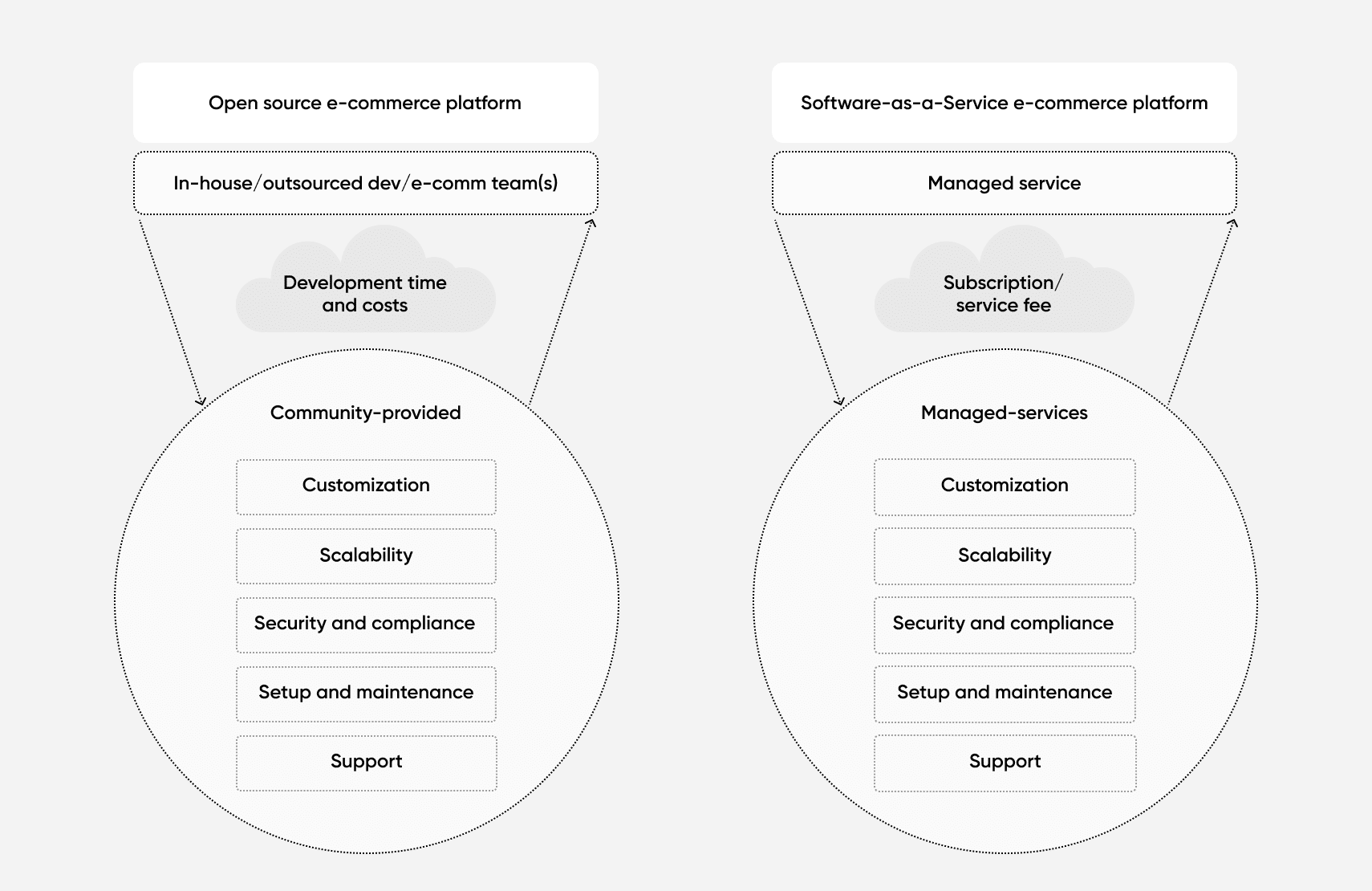
A summary of common features included in open source and SaaS e-commerce platforms is illustrated in the table below.
| Feature | What it does | Open source e-commerce platform capability | SaaS e-commerce platform capability |
| Customization | It determines the extent to which a retailer can make unique changes to the store. | Yes (unlimited) | Yes (limited) |
| Scalability | It determines how the website evolves and grows to support increased traffic and additional sales channels. | Yes (unlimited) | Yes (limited) |
| Setup difficulty and maintenance | It determines the difficulty and cost of implementing, launching, and maintaining the store. | Medium/high | Low |
| Security and compliance | It determines the difficulty in protecting the store from risks and threats. | Unmanaged (user responsibility) | Managed (provider responsibility) |
| Support | It determines how easily and quickly retailers can resolve issues. | Community-based | Dedicated support team |
Customization
Customizing your open source e-commerce solution helps you manage the customer journey and distinguish your business from its competitors. In contrast to SaaS solutions — such as certain monolithic software — open-source e-commerce platforms provide you with full access to the source code.
Open-source e-commerce platforms don’t restrict your store to any one ecosystem, either. This lets your team focus on implementing the fundamentals most important to your e-commerce strategy. However, this can be a double-edged sword: unlimited customization outside of a concrete framework can result in your brand incurring technical debt from increased development time.
Scalability
Open source e-commerce platforms aren’t necessarily scalable by default. However, open source solutions based on open architecture let brands scale as needed — particularly if that architecture supports integrations with third-party tools and services, such as microservices.
Such integrations let stores evolve over time. Without being restricted to a given ecosystem or architecture, a brand can integrate necessary tools and services into its open source e-commerce solution without incurring technical debt or requiring clunky workarounds.
Setup difficulty and maintenance
An open source e-commerce platform isn’t a turnkey solution. Developing, launching, and maintaining such a store requires time to continually iterate and maintain the installation. Without the backing of a service provider, your team is fully responsible for ensuring your store is accessible and functions as you — and your customers — expect.
As your store grows in both popularity and functionality, your team is responsible for improving and maintaining metrics such as site speed, downtime, and cohesion between different integrations and services. At the same time, installing and maintaining an open source e-commerce platform gives your team the familiarity and access necessary to customize and run your store in a way that best makes sense for your brand.
Security and compliance
In 2020, security incidents targeting e-commerce grew by 20% and 71% of open source codebases contained security vulnerabilities in 2020. Though open-source e-commerce platforms are arguably more secure than closed source alternatives, your team is entirely responsible for security and compliance. In contrast, with a SaaS solution, the service provider is partially responsible for securing some elements of the platform.
Open source e-commerce platforms must also remain compliant with PCI Security Standards and other security best practices. This means your team must be responsive in implementing community-sourced patches and fixes rather than relying on a service provider to handle security flaws for you, as is the case with a SaaS solution.
Support
SaaS e-commerce solutions provide dedicated support on an ongoing basis. With an open source e-commerce platform, support is dependent on community and vendor contributions. However, the actual task of implementing resolutions falls to your team.
Support from open source contributors can lead to quick and diverse resolutions and answers but still contributes to the total cost of ownership (TCO) of your e-commerce initiative. In contrast, support is baked into the SaaS fee, helping your brand stay on budget and sourcing fixes, patches, and resolutions directly from the vendor and its experts.
[toc-embed headline=”Open Source E-Commerce Platform Options”]
Open Source E-Commerce Platform Options
Like SaaS alternatives, open source e-commerce platform options vary in capabilities, features, and limitations. At the same time, the best open source e-commerce platform for your brand should provide the necessary flexibility and power to support your e-commerce strategy and goals. The table below compares and highlights popular open source e-commerce platform options.
| nopCommerce | Shopware | CubeCart | Sylius | Solidus | |
| Multi-store and multi-vendor | Yes | Yes1 | No | Yes6 | Yes |
| Mobile support | Yes | Yes | Yes5 | Yes | Yes |
| Product management | Yes | Yes | Yes | Yes | Yes |
| Multiple payment methods | Yes | Yes2 | Yes | Yes | Yes |
| Shipping/logistic management | Yes | Yes | Yes | Yes | Yes |
| Integrated marketing/ analytics | Yes | Yes | Yes5 | Yes | Yes |
| Third-party integrations/plugins | Yes | Yes | Yes | Yes | Yes |
| Internationalization | Yes | Yes | Yes | Yes | Yes |
| API availability (headless) | No | Yes | No | Yes | Yes |
| Docker/K8 support | Yes | Yes3 | No4 | Yes | Yes |
| Premium offerings | Yes | Yes | Yes | Yes | No |
1Multi-vendor is supported via plugins
2Direct integration with PayPal and others through plugins
3Docker installation is not recommended for macOS due to performance issues
4Third-party docker containers are available
5Supported via plugins
6Premium feature
nopCommerce
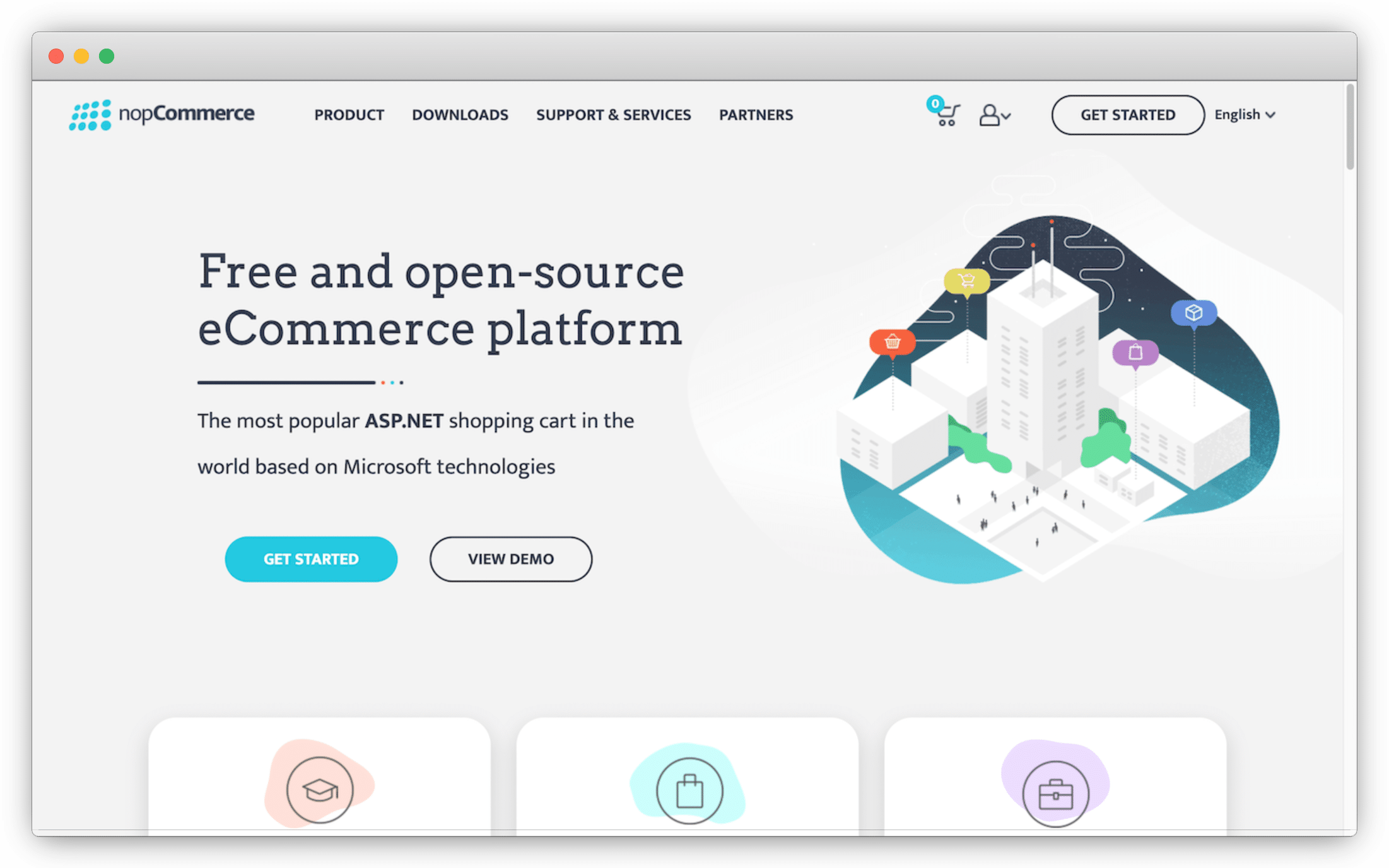
nopCommerce is an ASP.NET-based open source e-commerce platform first released in 2008. nopCommerce aims to provide a feature-rich, free, and open source e-commerce platform designed to support SMBs with enterprise-level functionality.
nopCommerce is an out-of-the-box solution for B2B and B2C retailers. It provides a wide array of features, such as multi-vendor/multi-store configurations, product management, payment and tax management, and customer service.
The platform also supports the widest range of third-party integrations for payment modules, shipping management, marketing, and administration. The open source nature of nopCommerce supports enables extensive customization, from simple themes to the modification of individual functions to suit the exact requirements of users.
nopCommerce is fully compliant with PCI DSS to provide a secure payment platform to all the integrated payment methods. In addition, it remains continually up-to-date with the requirements of GDPR in the European Union, effectively cutting down on time spent ensuring your organization is in compliance.
Shopware
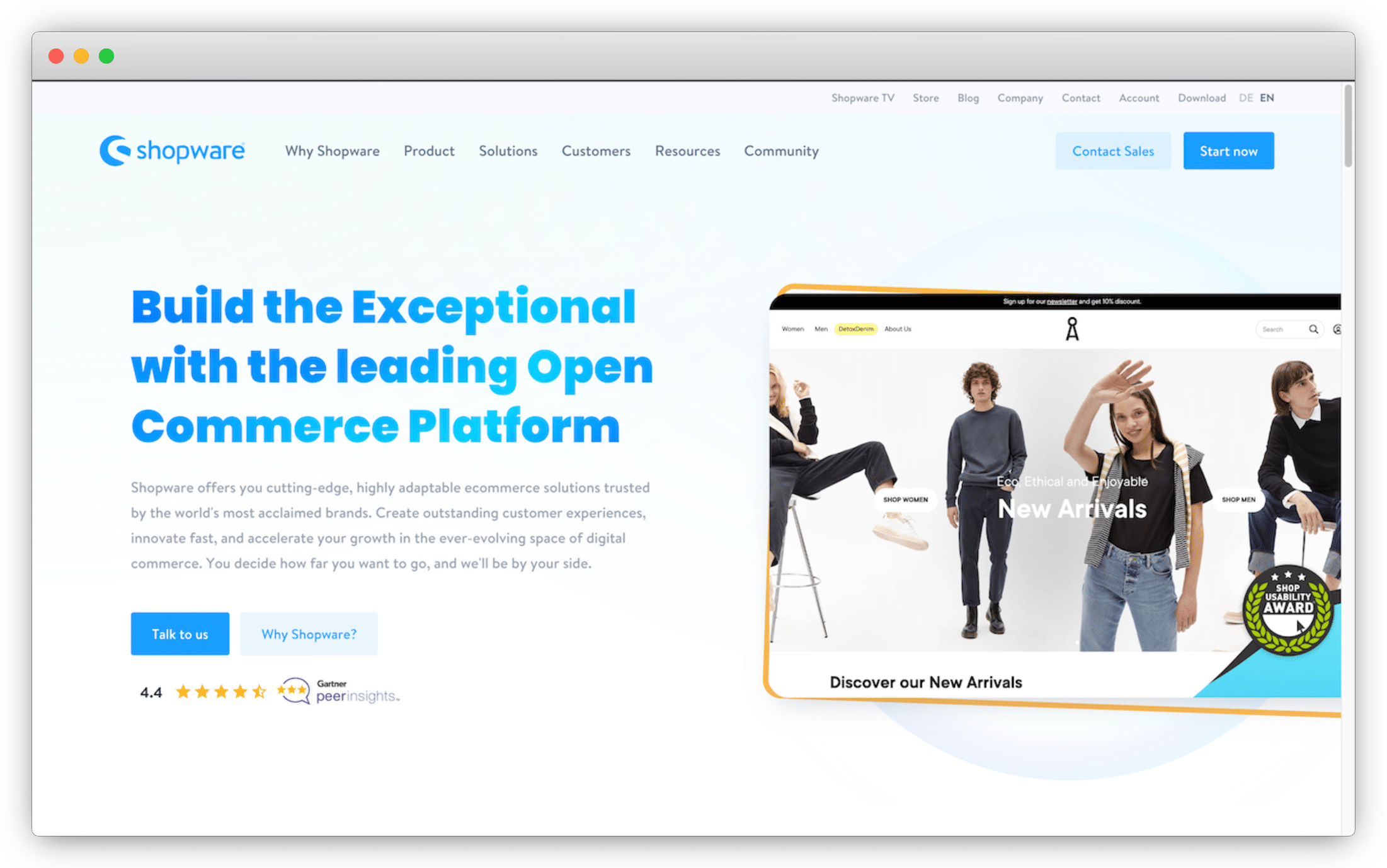
Shopware was founded in 2000 to provide an open source e-commerce platform that can help businesses move their operations online. The current implementation of Shopware — which is distributed under the MIT license — utilizes Twig and Bootstrap to power the storefront while using Vue.js and twig.js to power the administration interface.
Shopware provides services through REST APIs and offers rich user interfaces that enables developers and administrators alike to use their preferred method to interact with the platform. Shopware commonly gathers retailer feedback to inform future development decisions and better cater to user requirements.
One of the primary draws of Shopware is its minimal learning curve and simple and intuitive design. It supports integrations with different sales channels and social media platforms to increase visibility to customers.
Both B2C and B2B business modules are supported under this platform. In addition, Shopware is designed to be performance-centric and highly scalable through itsPlugin Manager functionality, which lets users extend upon this open source e-commerce platform with other tools and services.
CubeCart
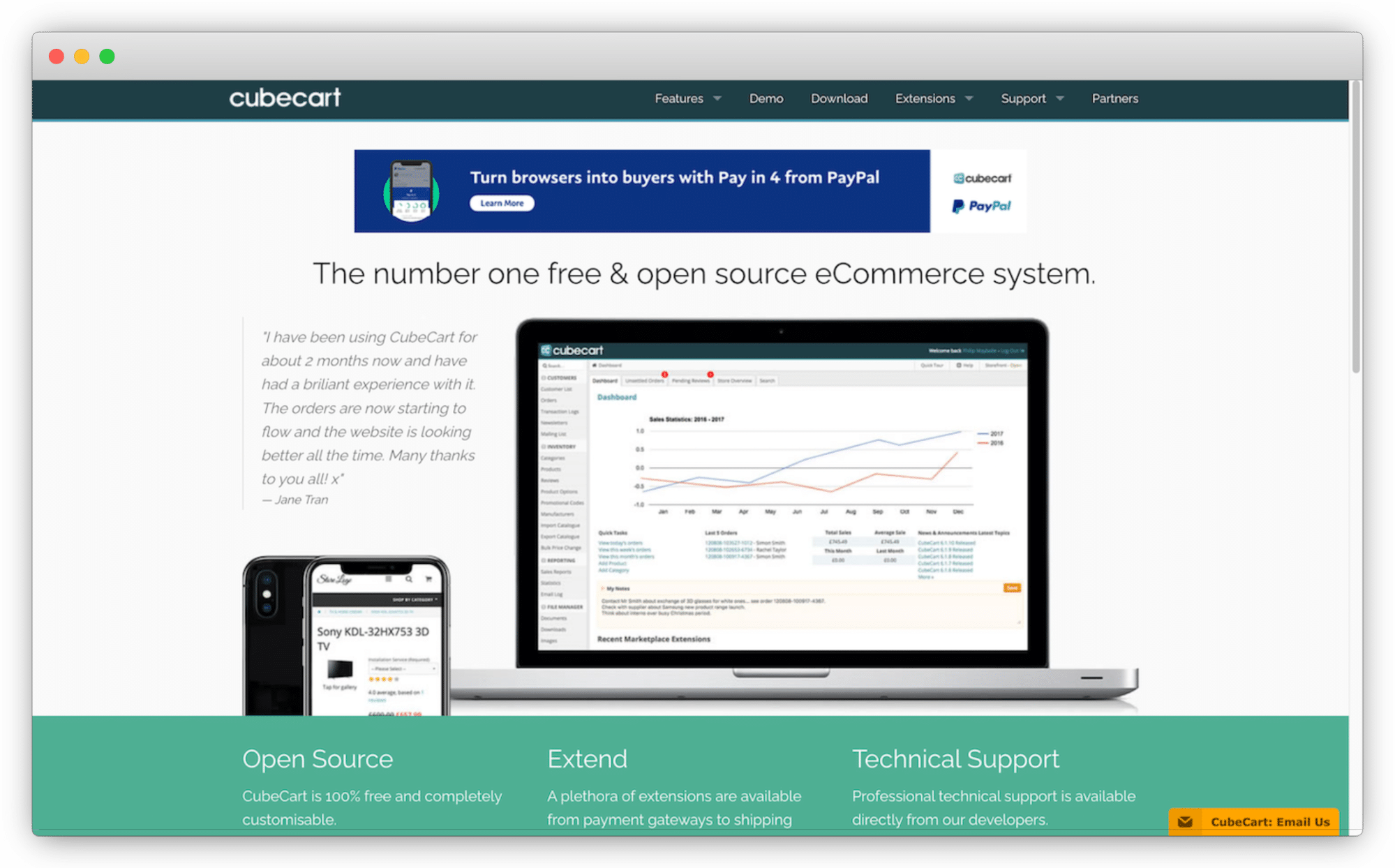
CubeCart is a straightforward open source e-commerce solution distributed under the GPL 3.0 license, with a focus on stability and security.
CubeCart is actively developed on a regular basis and is backed by a thriving community, with security audited by Netsparker. It uses the Smarty Template Engine to create a template-driven responsive frontend. Additional functionality includes product, payment, and logistical management, allowing for a comprehensive open source e-commerce solution.
One of the best features of this platform is its extensive log functionality, from simple transaction logs to server error and request logs. These logs enable platform administrators to be aware of the complete behavior of the storefront. Additionally, CubeCart provides built-in support for Google Analytics and SEO tools and can be further extended using free and paid extensions.
Sylius
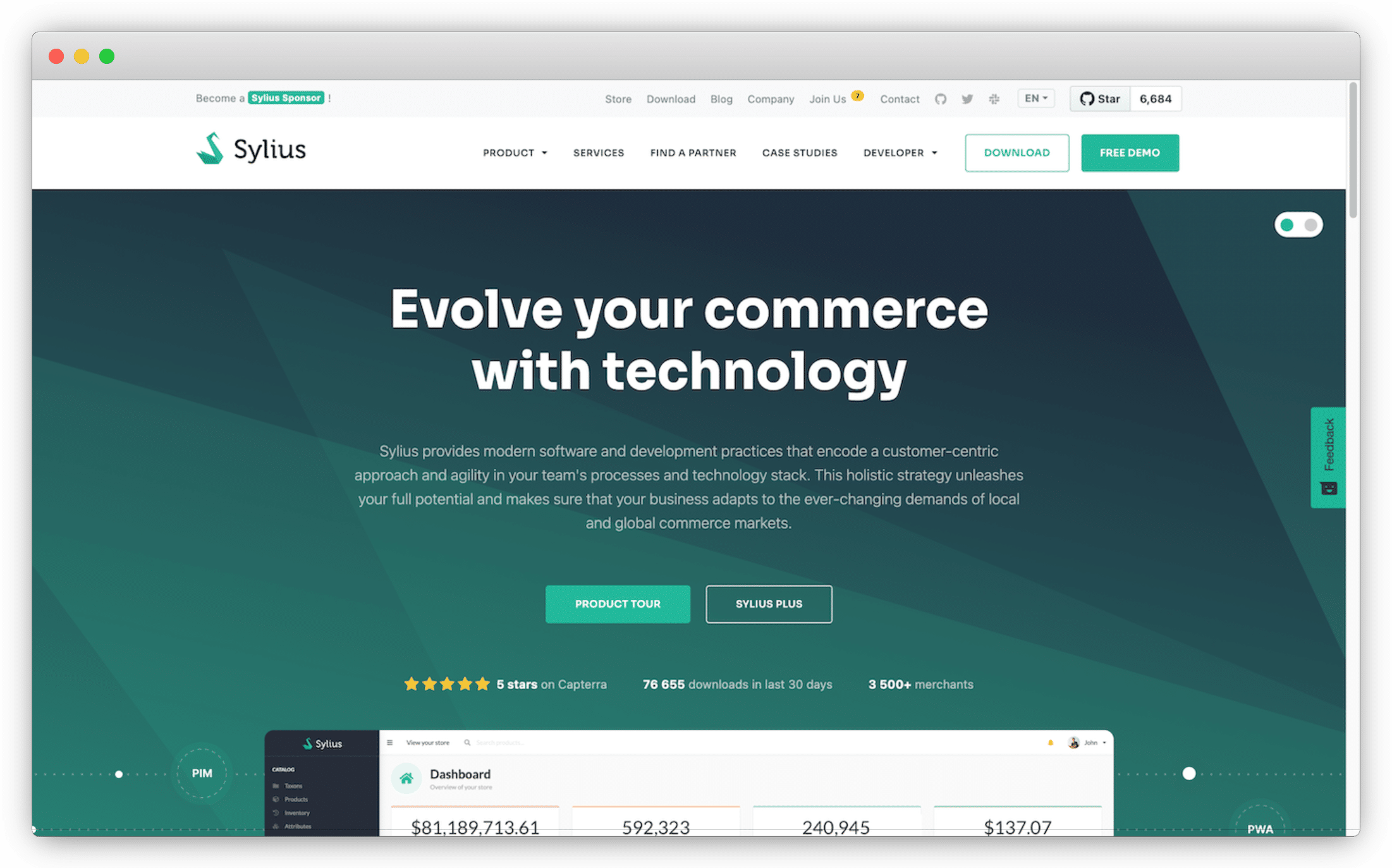
Sylius is a headless open source e-commerce platform targeting mid-market and enterprise customers that require custom e-commerce solutions. It is built on top of the Symfony framework and developed using full-stack Behavior-Driven Development with phpspec and Behat.
Sylius is freely available and distributed under the MIT license. Sylius is designed to be the nexus of your e-commerce stack due to the headless nature of the platform. This gives developers the freedom to build custom interfaces to suit the desired sales channel, whether it’s a mobile platform, point of sale kiosk, or a progressive web app.
Sylius can be used out-of-the-box with its provided functionality or can be integrated into an existing PIM, CRM, or automation software using the powerful REST API. The platform can be further extended using Sylius plugins to add more functionality, such as simple content and customization options or complex reporting and analytics features.
Solidus
The Solidus open source e-commerce platform is developed using Ruby on Rails. The project started its life as a fork of the Spree Commerce platform and gradually evolved into a fully-featured e-commerce solution.
Solidus is targeted towards digitally native brands and fast-growing online businesses with a high focus on stability, flexibility, and scalability. What sets this platform apart from others is its adherence to the open source mindset. It consists of a well-defined and public roadmap for development and transparent funding through the Open Collective Solidus community.
Solidus offers both RESTful API and GraphQL API for a truly headless e-commerce experience. The three main components of Solidus are its Product Catalog, Payment, and Logistics features. The product section provides inventory and product management, while the payment component manages payment integrations, subscriptions, and taxations. Finally, the logistic management tackles the shipping, returns, and exchanges.

Content marketer @ fabric. Previously marketing @ KHON-TV and Paramount Pictures.
